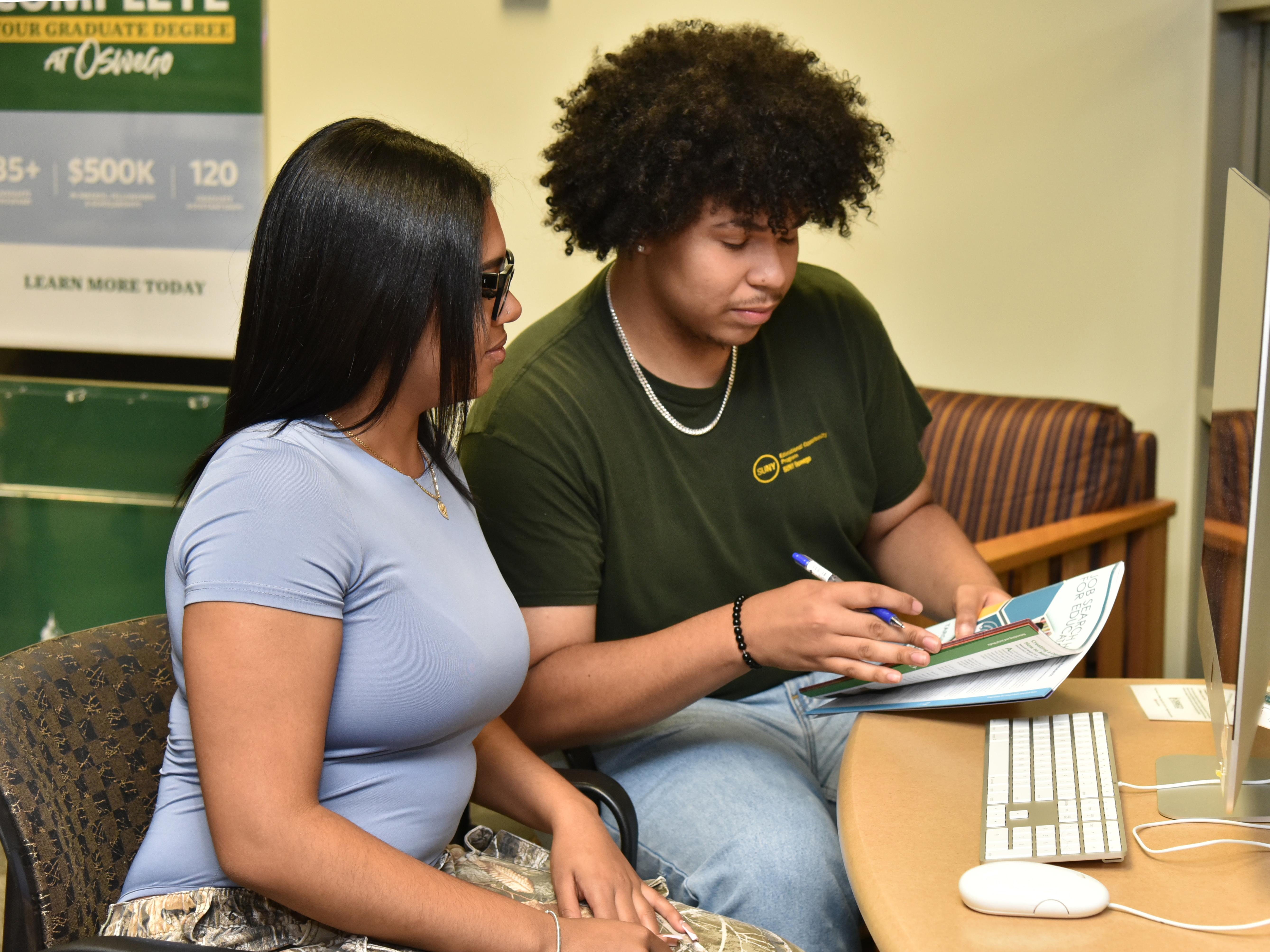Rosely Paulino and Jeudin Alvarez are among the peer mentors in SUNY Oswego's new Money Matters financial literacy program.
A new Money Matters program headquartered in SUNY Oswego’s Financial Aid Office launched in August 2024 and has already reached hundreds of students by providing financial literacy resources.
And that, program organizers said, is just the beginning.
The program, carried out by six paid student mentors, is supported by a Title III grant from the U.S. Department of Education. The “Student Success Equity Project: Advancing Equity Through Intentional Peer-to-Peer Supports and Inclusive Pedagogies,” funded under the Title III Strengthening Institutions Program, included resources to increase SUNY Oswego’s capacity to engage, retain and graduate all students while addressing any potential gaps in course performance, retention and graduation rates.
Student focus groups previously indicated a desire to better understand financial options and resources to help them successfully navigate paying for college. Thus Money Matters focuses on available financial resources, budgeting, spending money wisely, risk management, loan information and much more.
“This kind of financial literacy program hasn’t really existed in the past,” said Yadi Aranda Burgos, senior financial aid advisor and Money Matters coordinator. “It’s a resource our campus provides, and students seem really receptive to it.”
Burgos gave the student peer mentors –- who make connections, answer questions and do outreach –- plenty of credit for the great success the program is seeing already.
“Our peer mentors are doing a lot of work to get this up and running,” Burgos said. “They’re making it very accessible to our students.”
“My favorite part of this job is being able to help people,” said peer mentor Gianna Diaz, a junior in Oswego’s five-year master of business administration program. “Our goal and my job is to teach the campus about financial literacy, one student at a time. We’re ambassadors for our classmates, friends and all students of SUNY Oswego.”
Peer mentor Rosely Paulino, a senior human development major, agreed that advising other students was the best part of the job.
“We get to present to all the classes, especially freshmen. We always try our best to help them,” Paulino said. “This program also helps me learn about many financial necessities that are required for any college student.“
Junior business administration major Josh Llanos has learned a lot via the Financial Aid Office and appreciates the opportunity to pay it forward, which includes staffing the office between 4:30 and 6:30 p.m. – a time that might be more accessible for current students.
“I’ve been coming here since my freshman year, and now working for the Financial Aid Office, I get to help others, so I really wanted to take this opportunity,” Llanos said.
Building connections
The program has started by speaking with the Educational Opportunity Program summer program, Advancing Completion through Engagement (ACE) students, first-year general studies (GST) courses and more – “around 60-70 classes in just September and October,” Burgos said.
“We’re now connecting with different deans in different schools presenting how we provide these resources,” Burgos added. “We’re still working on establishing those relationships. Working on outreach, telling professors about resources and speaking with directors across the Division of Student Affairs. We’re doing a lot of outreach to staff so they can do outreach to their students.”
Partnerships and support in other avenues are helping as well. Burgos is pleased with initial conversations for a podcast with student-run radio station WNYO. The Admissions Office’s Instagram account initiated a Financial Aid Fridays feature to showcase the people and resources the office has.
Additional efforts include a monthly newsletter and peer mentors staffing a table in Marano Campus Center every Thursday. Peer mentors are also speaking with students in residence halls – and really sharing their availability anywhere and any way possible. They also are trying to find ways to reach non-traditional and part-time students, who can also benefit from these financial resources.
“Whenever they need us, if we have the time, we’ll help them with anything,” Llanos said.
The program’s first two external partnerships –- with AmeriCU and Citizens Bank –- are expected to result in experts from those financial institutions coming in and speaking regularly with students.
For the peer mentors, the ability to help others while gaining professional experience is proving extremely valuable.
“It’s definitely helped me with my professional skills, especially with public speaking and assisting others,” Paulino said. “That’s our main goal. I’m also learning how to budget.”
“You’re learning and teaching others as well,” Diaz explained. “I feel like this is building skills for my personal and professional life. Personally, it encourages me to manage my money properly and I can also teach my family about financial literacy.”
The team is tracking results and looking to make this a long-term part of the toolkit that supports students and their financial literacy.
“We’re doing a lot in our short amount of time so far,” Burgos said. “After the grant, the program will continue.”
For more information, visit oswego.edu/financial-aid.




